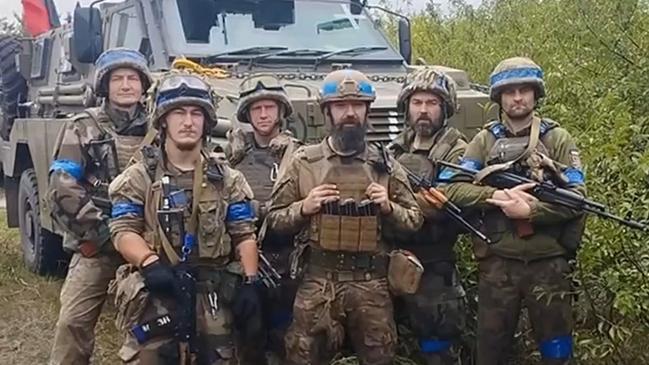
Defeating Russian aggression in Ukraine and deterring potential aggressors from future attempts to seize territory by force is essential for preserving the rules-based global order. This is why Australia must step up our support for Ukraine.
Australia’s provision of Bushmasters and other armoured vehicles to Ukraine has been helpful, but it is failing to keep pace with developments on the ground and risks being woefully inadequate to the stakes.
Australia needs to ensure Ukraine has the trained military personnel to counter the surge of fresh Russian troops that Putin’s mobilisation has set in train. Britain is doing the bulk of this work, giving basic military training to new Ukrainian recruits before returning them to the frontline. More than 5000 Ukrainian recruits have been through this program. Canada, Denmark and The Netherlands are already sending military trainers to Britain. Even our smaller neighbour, New Zealand, has sent 120 soldiers to assist with the mission.
The Australian Defence Force is well-versed in such training operations, having helped train Iraqi and Afghan security forces regularly during the past decade.
Our operational tempo is currently low. We have the capacity and expertise, and can spare the soldiers. Australia should provide basic training, supporting British efforts, or more specialised training on key weapons systems.
The situation has deteriorated for the Russian President in recent weeks. Ukrainian forces advancing in the east have broken through Russian lines and liberated 6000sq km of territory – more than Russia had gained in territory in the previous five months.
Ukrainian forces also are making gains in the south towards Kherson. Last weekend a Ukrainian operation exploded several sections of the only bridge linking Crimea to Russia, the Kerch bridge, severely disrupting the most important supply line for Russian troops in southern Ukraine. In response, Russia has increased its bombardment of civilian infrastructure from the air, targeting the recently liberated city of Kharkiv and the Zaporizhzhia nuclear power plant.
Russia is more isolated internationally. A chastened Putin was reduced to apologies at a recent regional meeting, promising to address concerns raised by Chinese President Xi Jinping and Indian Prime Minister Narendra Modi.
His attempts to break European unity and resolve by weaponising gas and cutting off Nord Stream 1 have failed. European solidarity remains intact, alternative energy supplies are being found and Europe is finding ways to cushion its public from the impact of spiking energy prices.
Putin has responded to the deterioration with further aggression, which must be met in turn. He has announced the mobilisation of reservists inside Russia, formally annexed Ukrainian territory following sham referendums and raised the spectre of the use of nuclear weapons.
Up until this point Putin has resisted describing his offensive in Ukraine as a war, calling it instead a “special military operation”, and attempting to shield the Russian public from its impact. Now Putin is having to wear the domestic scrutiny of his offensive. The depletion of Russian manpower in Ukraine – estimates are that 70,000 to 80,000 of Russia’s soldiers have been killed or wounded – has left him with little choice.
The limited mobilisation under way is already proving unpopular. Protests have broken out and tens of thousands of eligible conscripts have fled Russia.
Russia’s purported annexation of Ukrainian territory allows Putin to rationalise and justify his military operations there as self-defence. It also may provide him with the pretext to threaten the use of tactical or battlefield nuclear weapons: Russia’s nuclear doctrine permits the use of such weapons if Russian territory is being attacked.
Russia’s decision to mobilise reservists reveals the deterioration of Putin’s position, but we should not underestimate its battlefield impact. Ukraine is already fully mobilised, with all men of fighting age conscripted into the nation’s defence. Many of these lack any military training whatsoever.
Russia, hesitant about potential domestic unrest, to date has not used its vast manpower advantage over Ukraine. This mobilisation marks the first step.
In the past, Russia has turned the tide of military setbacks by drawing on its massive internal reserves, ultimately repelling the assaults of Napoleon and Hitler. It may do so again.
Australia talks a big game about protecting the rules-based global order. Russia’s invasion of Ukraine is the most naked and aggressive challenge to this order.
When Anthony Albanese met Ukraine’s President Volodymyr Zelensky in July, the Prime Minister promised that Australia would “stand side-by-side with the Ukrainian people in their time of need”. That time of need is more pressing than ever.
If we are serious about rolling back this threat, then the most material impact we can have is to ensure Ukraine’s soldiers – who are bearing all the human cost of this war – are provided with the training they need to prevail.
Dave Sharma is a former diplomat and member of federal parliament.




Russian President Vladimir Putin has been on the back foot these past weeks, but he has doubled down on his aggression. The war in Ukraine is likely to reach a new level of intensity.